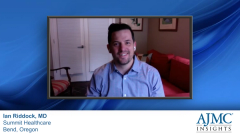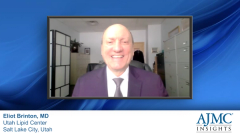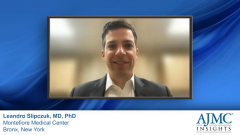
The Future of LDL Management for Patients With High-Risk ASCVD
Three cardiovascular experts discuss the future of lipid management for patients with high-risk ASCVD.
Episodes in this series

Ian Riddock, MD: As far as the future goes for lipid management in populations and risk reduction, and with the way that we’re moving with performance measures and reducing total cost of care, I see a tremendous opportunity for various preventive societies, medical societies to better develop guidelines with cost of care in mind. The American College of Cardiology, it was good that they introduced cost into their guidelines. What I would like to see is other organizations start to develop performance measures of their own based off the best available data and make these living documents that continue to roll as we develop more data. Then provide those guidelines, if you will, or expert consensus statements, for instance, to health care organizations, to the community. And as we get that feedback, with the power of EHRs [electronic health records], you could make a dent in prevention by streamlining various clinical pathways, various protocols, various tools within our EHR to recognize.
I’ll give you an example. What I would love to see in our practice is when a new patient comes in and we upload all of their data, if they’re a high-risk individual based off of the data that’s been uploaded into our system, I want to see a 4-alarm fire go off. I want to see bells and whistles pinging all of us, almost like a virtual onslaught, like a code blue event in a hospital, analogous to that, where everyone comes running. This is more obviously in a virtual way, where those buttons trigger us that you just encountered a high-risk individual, and here’s what we recommend doing for this individual. We’re getting there. I don’t think we’re anywhere close to that, but that’s how I feel we could use some of these tools in managed care to affect hospital admission rates, to reduce unfortunate demise, and to reduce total cost. But we can do it, I think.
Eliot Brinton, MD: With all this great stuff that’s happened in the recent past, in the distant past, where are we headed now? What’s the future of LDL [low-density lipoprotein] lowering? No. 1 is simply implementing what we have. We now have an embarrassment of riches in terms of LDL-lowering tools. First and foremost is just to use what we have and doing it in a way where there’s cooperation between the doctor and the patient. We can’t be at odds with each other. We’ve got to be on the same page. We’ve got to be listening to each other, hearing what each other is saying, accommodating each other’s perspectives in a way that is very helpful, and not the traditional thing where the doctor says you’re going to do this and then the patient says, well, either, maybe I will, or maybe I won’t. Oftentimes there is compliance fatigue, where the patient may, after a year or 5 years or 10 years, just kind of give up. We do need to be a cheering section for the patient, cheerleaders to encourage them, to pat them on the back, “you’re doing a great job.” We need to measure lipids routinely. LDL must be measured at least, at a bare minimum probably twice a year, just because we need to keep track of it. It can go up and down, things will change, not compliance changes, but the human body can change over time.
Is there anything else? The answer is yes. We’re blessed with a very aggressive and innovative pharmaceutical industry, and there are lots of medications coming down the pike, some for LDL, some for other indications. We need to keep our ear to the ground, our finger to the wind, for what’s coming, what’s happening. New things will happen. One very exciting thing I’ll mention specifically is gene editing. It sounds a little scary, it is a little scary. The idea is to get into the DNA and alter the DNA itself, make a permanent change in the person’s genome that will then get rid of a mutation they have that is raising their LDL level. If we can’t do that, maybe provide another gene change that will give them a supergene to overcome maybe a polygenic effect that they might have or some other familial disorder that is raising the risk of atherosclerosis.
That is in process. I don’t hold my breath. I don’t think it’s going to come right away. It’ll take a bit of doing before we’re comfortable in doing that, but we may get to the point where we will have vaccines, so to speak, for LDL that may help a patient for their lifetime, or at least maybe 5 or 10 years at a time. I’m very excited about that possibility. We have lots of great tools already. But for the patient who is really concerned, “Do I have to take this pill for the rest of my life? Do I have to do these shots for the rest of my life,” the quick answer is probably not because we will probably get something so innovative that our current paradigm of lipid treatment will be superfluous and won’t be needed in most cases.
Leandro N. Slipczuk, MD, PhD: In the near future, I see the management of LDL for the high-risk and very high-risk patients, I see it as a more population-based approach. As we were talking about before, I see it as a change from just waiting for the referral. I see institutions being more proactive in doing population-based management. I see institutions identifying the high-risk patients and following up with them about why they aren’t meeting their lipid goals. Or making patients aware that if they don’t meet their goals, they’re at risk of having a heart attack, and offering them options, offering them counseling in diet, offering them a place where they can go and see a specialist. I see it as a more proactive approach from the health care institutions in reaching the goals. And I see the growth in telemedicine as playing a big role in this. But the problem always is where the resources come from to set these things up. If we have payers rewarding approaches like this, and we have Medicare in general, and we have our politics, our politicians rewarding these movements, we have the potential to reduce cost and optimize patient management with this transition.
This transcript has been edited for clarity.
Newsletter
Stay ahead of policy, cost, and value—subscribe to AJMC for expert insights at the intersection of clinical care and health economics.












